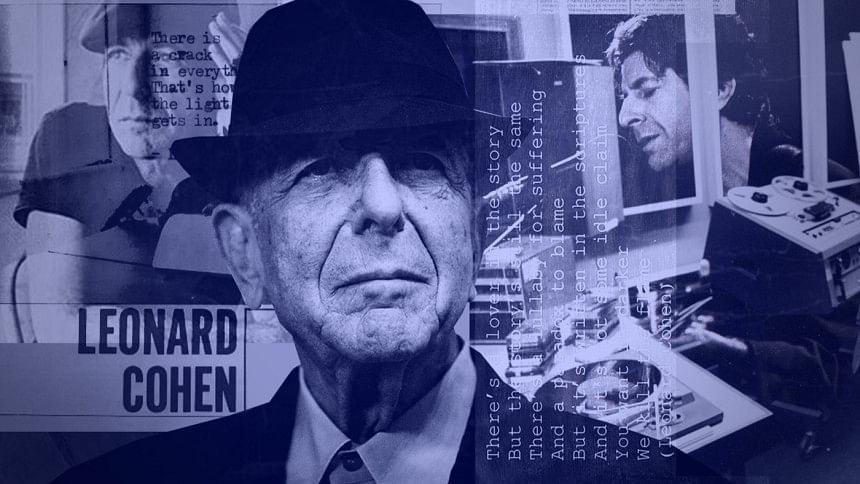Leonard Cohen: ‘Our Shelley, our Byron’

Leonard Norman Cohen was born on this day in 1934 in Quebec, Canada. His work explored religion, politics, isolation, depression, sexuality, loss, death, and romantic relationships.
"There are very, very few people who occupy the ground that Leonard Cohen walks on," said Irish singer-songwriter Bono. "This is our Shelley, this is our Byron."
Cohen's legacy has left behind many beautiful compositions in "Suzanne", "Sisters of Mercy", "Famous Blue Raincoat", but his most popular composition remains from his 1984 album "Various Positions", called "Hallelujah".
The song took Cohen five years to write. Since then, the song has been used many times over in movies, TV shows, and 9/11 tributes. There are more than 300 versions of the song.
Cohen once complained about its ubiquitousness. "I think it's a good song," he said in 2009. "But I think too many people sing it."
Famous Nirvana frontman, Kurt Cobain, once sang, "Give me a Leonard Cohen afterworld/ So I can sigh eternally." The "poet of brokenness", as referred by Milkal Gilmore, an American writer and music journalist who interviewed Cohen on multiple occasions, trod on all three worlds of music, poetry, and novels, with a mastery very few had.
The "brokenness" proved central to his music and his body of poetry and literature. "Depression has often been the general background of my daily life," Cohen had told Milkal. "My feeling is that whatever I did was despite that, not because of it. It wasn't the depression that was the engine of my work. That was just the sea I swam in," Cohen added.
Cohen wrote poems and novels during the 1950s and early 1960s. His musical career began in 1967 at the age of 33.
He published his first poem back in March 1954 as a student of McGill University in a magazine. His literary influences during the initial years included William Butler Yeats, Walt Whitman, Federico García Lorca and Henry Miller, among others.
Cohen published his first book of poetry -- "Let Us Compare Mythologies" -- in 1956. Regarding the book, he said that it was "as good as anything" he ever wrote.
His next book of poems, "The Spice-Box of Earth" (1961), helped Cohen gain critical recognition as an important new voice in Canadian poetry.
Cohen's contemporary literary critic Robert Weaver found the book powerful and declared that Cohen was "probably the best young poet in English Canada right now."
Cohen published his novel "The Favourite Game" while living in Hydra, a Greek island. The book gained notable attention from the Canadian literary world. However, it did not earn Cohen much money.
His novel "Beautiful Losers" (1966) was also published when he was living on the island.
Regarding "Beautiful Losers", the Boston Globe said, "James Joyce is not dead. He is living in Montreal under the name of Cohen!"
Cohen's process of writing, as he told an interviewer in 1998, was "like a bear stumbling into a beehive or a honey cache: I'm stumbling right into it and getting stuck, and it's delicious, and it's horrible, and I'm in it, and it's not very graceful, and it's very awkward, and it's very painful, and yet there's something inevitable about it."
Disappointed with his writing career, Cohen moved to the United States in 1967 to pursue a career in music.
His first song, "Suzanne" became an instant hit! Regarding Suzanne, the Grammy Award-winning American singer Judy Collins once said, "People think Leonard is dark, but his sense of humour and his edge on the world is extremely light."
Reportedly, Cohen was duped into giving up the rights for the song. However, he was also glad it happened, "as it would be wrong to write a song that was so well-loved and to get rich for it also," he said.
Cohen's 14th and final album, "You Want it Darker", was released on October 21, 2016, just months before his passing.
The 82 year-old Cohen passed away peacefully in his sleep on November 7, 2016, at his Los Angeles home, suffering from leukemia.
His death news broke on November 10. His funeral was held in Montreal on the same day.
As per his wish, Cohen was laid to rest with a Jewish rite, in a simple pine casket, in a family plot in the Congregation Shaar Hashomayim Cemetery on Mount Royal.

 For all latest news, follow The Daily Star's Google News channel.
For all latest news, follow The Daily Star's Google News channel. 



Comments